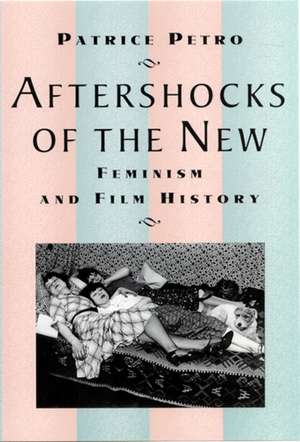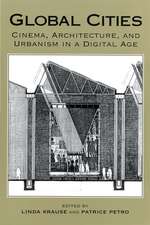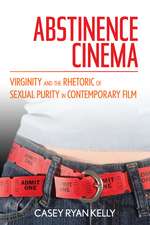Aftershocks of the New: Feminism and Film History: New Directions in International Studies
Autor Patrice Petroen Limba Engleză Paperback – noi 2001
The beginning of this century has brought with it a host of assumptions about the newness of our technologies, globalized economies, and transnational media practices. Our own time is a period marked by experiences of fragmentation, sensation, and shock. The essays here are joined by a common concern to chart another side to modernity—precisely after the shock of the new—when the new ceases to be shocking, and when the extraordinary and the sensational become linked to the boring and the everyday. Patrice Petro explores how the mechanisms of modernism, German cinema, and feminist film theory have evolved, and she discusses the directions in which they are headed.
Petro’s essays—some published here for the first time—raise such questions as: What roles do television and other media play in film studies? What is the place of feminist film theory in our conceptions of film history? How is German film theory situated within international film theory?
Rather than continue to sensationalize sensation, Aftershocks of the New aims to lower the volume of debates over the place of cinema within the culture of modernity. And it accomplishes this by locating them within a more complex matrix of contending sensibilities, voices, and impulses.
Petro’s essays—some published here for the first time—raise such questions as: What roles do television and other media play in film studies? What is the place of feminist film theory in our conceptions of film history? How is German film theory situated within international film theory?
Rather than continue to sensationalize sensation, Aftershocks of the New aims to lower the volume of debates over the place of cinema within the culture of modernity. And it accomplishes this by locating them within a more complex matrix of contending sensibilities, voices, and impulses.
Preț: 314.97 lei
Nou
Puncte Express: 472
Preț estimativ în valută:
60.27€ • 64.45$ • 50.25£
60.27€ • 64.45$ • 50.25£
Carte tipărită la comandă
Livrare economică 17 aprilie-01 mai
Preluare comenzi: 021 569.72.76
Specificații
ISBN-13: 9780813529967
ISBN-10: 0813529964
Pagini: 232
Dimensiuni: 152 x 229 x 15 mm
Greutate: 0.37 kg
Ediția:None
Editura: Rutgers University Press
Colecția Rutgers University Press
Seria New Directions in International Studies
ISBN-10: 0813529964
Pagini: 232
Dimensiuni: 152 x 229 x 15 mm
Greutate: 0.37 kg
Ediția:None
Editura: Rutgers University Press
Colecția Rutgers University Press
Seria New Directions in International Studies
Notă biografică
Patrice Petro teaches film studies in the English department at the University of Wisconsin-Milwaukee, where she is also the director of the Center for International Education. She is the author of Joyless Streets: Women and Melodramatic Representation in Weimar Germany, and the editor of Fugitive Images: From Photography to Video.
Cuprins
Introduction
The "place" of television in film studies
Feminism and film history
German film theory and Anglo-American film studies
After shock, between boredom and history
Historical ennui, feminist boredom
World weariness, Weimar women, and visual culture
Nazi cinema at the intersection of the classical and the popular
The Hottentot and the Blonde Venus
Film feminism and nostalgia for the seventies
The "place" of television in film studies
Feminism and film history
German film theory and Anglo-American film studies
After shock, between boredom and history
Historical ennui, feminist boredom
World weariness, Weimar women, and visual culture
Nazi cinema at the intersection of the classical and the popular
The Hottentot and the Blonde Venus
Film feminism and nostalgia for the seventies
Recenzii
In this vibrant collection of essays, Patrice Petro draws on her capacious understanding of feminist theory and German film theory to articulate what is, was, and should be at stake in our interpretive practices. Whether analyzing the disorienting photomontages of Hannah H÷ch, the disturbing portraits of Otto Dix, or the charged performance of Marlene Dietrich in Blonde Venus, Petro remains firmly in command of historical contexts, theoretical implications, and ideological consequences.
Patrice PetroÆs Aftershocks of the New is unified by a focus on the connection between feminist film criticism and historical research. It also invokes a history of the film studies discipline (including television) as she rehearses and comments upon some of the major debates in the field over the past two decades.
Descriere
The beginning of this century has brought with it a host of assumptions about the newness of our technologies, globalized economies, and transnational media practices. Our own time is a period marked by experiences of fragmentation, sensation, and shock. The essays here are joined by a common concern to chart another side to modernity—precisely after the shock of the new—when the new ceases to be shocking, and when the extraordinary and the sensational become linked to the boring and the everyday. Patrice Petro explores how the mechanisms of modernism, German cinema, and feminist film theory have evolved, and she discusses the directions in which they are headed.




















